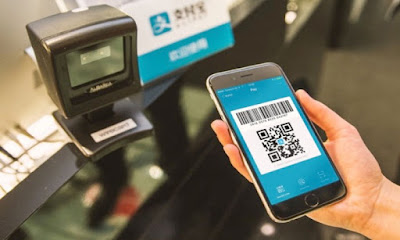Alipay (e-Wallet)
By Yu Jhan
Alipay is an e-Wallet payment method, a secure platform where
shoppers can store funds to be used online, essentially providing cashless
payment service for users. It is operated by Ant Financial Services Group. This
third-party online payment platform was launched in China in 2004 by Alibaba
Group and its founder Jack Ma. Apparently, Alipay is China’s largest mobile
payment app, with 450 million active users.
Alipay’s in-store payment service is currently accepted at
over 110,000 retail stores globally and supported in over 70 overseas markets.
Globally, especially in China, the digital wallet application can be used for
taxi, to book a hotel, buy movie tickets, even to make doctor’s appointments.
When come to the context in Malaysia, Maybank and CIMB have
signed up to partner with Alipay to enable the e-wallet service in the country.
How does Alipay work?
To use Alipay, you will have to open an account which is
recognized. For example, in Malaysia we know that Maybank and CIMB will provide
the cashless payment service by acting as the settlement and merchant acquirer
bank to facilitate Alipay.
Shoppers will need to register with Alipay before making
payment with it. Online shoppers can then choose which Alipay payment method to
use on the payment page. Then they will be redirected to the Alipay website to
complete their payment.
There are three ways
to make a payment with Alipay:
- For shoppers using a desktop device, they will have to use a mobile device (e.g. phone or tablet) to scan the QR code that appears on the Alipay payment page. This is the most popular payment method, used by majority of online shoppers who use Alipay.
- An alternative method for shoppers who use desktop is to use their Alipay credentials to log in to Alipay payment page. With this method, no mobile device is needed.
- For shoppers on a mobile device there is a payment method optimised for use on mobile devices.
Alipay can apply on: all 7-eleven
store in Malaysia, Resort World Genting, Kenny Roger, Cosway, Duty Free Zone,
Parkson, Starbucks, SenQ.
Mozur, P. (2017). “In Urban China, Cash Is
Rapidly Becoming Obsolete. The New York Times. Retrieved from: https://www.nytimes.com/2017/07/16/business/china-cash-smartphone-payments.html




Wow nice sharing Yu Jhan, I never know about e-Wallet before this and after I read your entry I gain so much info about it especially how to use it and how its works especially in Malaysia.
ReplyDeleteHello, I find the E-wallet system really useful and safe. From this system, I don't have to bring cash around wherever I go. Malaysia should really implement this system as a main way of payment.
ReplyDeleteThank you Yu Jhan for sharing this. In my opinion, I am still quite skeptical about using e-wallet although I could not deny that it is very convenient. The question of should e-wallet be implement to the society in the future is still arguable
ReplyDeleteDo you guys know that Malaysia have our own e-wallet companies too? For example Sarawak Pay is newly used among Sarawakians today in paying bills. Companies like Boost and Fave Pay are also slowly emerging in Malaysia. I believe that e-wallet will certainly be a hit in Malaysia when more and more merchants can be found.
ReplyDeletethank you Yu Jhan. Nice sharing. hence, people also can use pay pal to do transaction and check the balance of money too and of course it's safe also to shop online.
ReplyDeleteThis comment has been removed by the author.
ReplyDeleteNice sharing Yu Jhan. Cashless are good because our money cannot be stolen or the seller do not to worry about do not have small money to return to us, but we must think do our money save?
ReplyDeleteThank you for sharing. I was doing a research about e-wallet on this semester and help me to understand more about e-wallet. But the funniest perception one of our respondent said that e-wallet will lead to laziness of people, because they don't even want to bring one more little credit card for shopping.
ReplyDelete